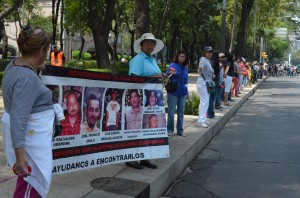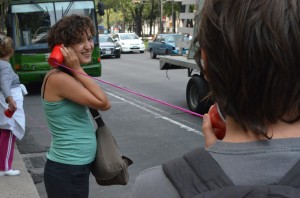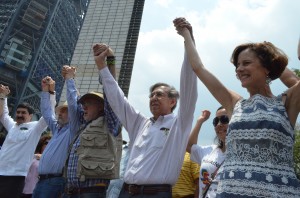 Nearly 7,000 protesters formed a human chain on April 26 to express opposition to legislation that would serve to enact the constitutional reform of the telecommunications sector.
Nearly 7,000 protesters formed a human chain on April 26 to express opposition to legislation that would serve to enact the constitutional reform of the telecommunications sector.
The string of people holding hands lined Reforma Avenue from the National Auditorium, the Monument of Light, the Anthropology Museum, the Angel of Independence and the La Palma traffic circle, continuing on to the headquarters of the Televisa media monopoly headquarters on Chapultepec Avenue. The event ended with a rally in front of the Senate.
The human chain that traversed the streets of Mexico City was described by renowned political commentator Denise Dresser as “a civic, independent, non-partisan citizens movement that seeks to protect the rights to good television, accessible phone services, and an affordable and free internet.”
“We’re dealing with an assault on our freedoms of information and speech,” Dresser said. “We can only defend them, and that is what we are doing with our actions. These are guarantees that exist in mature democracies, they are not surrendered and we will not waive them.”
The implementing laws for the telecom reforms, which the Senate has put off until June, “introduces a series restrictions on the use of the Internet, and also attempts to allow the federal government to intercept, use, and store the personal information of citizens, with the supposed aim of safeguarding national security,” she said.
The constitutional reform of the telecoms sector was approved in May 2013. It would allow 100 percent foreign investment, seeks to end monopolies, classifies telecommunications as a public service of general interest, establishes the right of access to information technology and communication, fosters competition and diversity, and guarantees universal coverage and free access to information networks.
But these mandates require secondary legislation to implement the reform and by law this was supposed to be approved last December. This constitutional limitation was violated because the bill was forwarded to the Senate by President Enrique Peña Nieto three months late.
Based on Peña Nieto’s proposal, and ignoring several initiatives from the Democratic Revolution Party and the Mexican Association for the Right to Information, the secondary legislation being finalized in the Senate aims to keep protections in place for government monopolies, leaves community radio stations and public media unprotected, and discourages independent productions. It also weakens the independent regulatory agency – the Federal Telecommunications Institute – by placing it under the executive branch.
Days before the demonstration, the proposed secondary legislation included restrictions and censure of Internet networks, and empowered authorities to shut down telecommunications services due to threats to national security.
 Poet-activist Javier Sicilia, leader of the Movement for Peace with Justice and Dignity and one of the organizers of the demonstration, called the proposal “a disaster,” and said that is why the human chain protest was held. “It is a backward law that fosters violence and authoritarianism,” he said. “As the state finds itself unable to provide security and guarantee democracy, it has decided to continue to control us, and we are not willing to allow this attempt to impose new forms of control.”
Poet-activist Javier Sicilia, leader of the Movement for Peace with Justice and Dignity and one of the organizers of the demonstration, called the proposal “a disaster,” and said that is why the human chain protest was held. “It is a backward law that fosters violence and authoritarianism,” he said. “As the state finds itself unable to provide security and guarantee democracy, it has decided to continue to control us, and we are not willing to allow this attempt to impose new forms of control.”
Sicilia’s son Juan Francisco was a victim of the drug war launched by former President Felipe Calderon and continued by the Enrique Peña Nieto administration essentially under the same terms. He criticized lawmakers for not representing the interests of the majority of Mexicans. “They have to represent citizens, not the interests of political parties, nor those of the powerful, or companies that have ripped apart the social fabric, culture and dignity of this nation.”
He lamented that the government is trying to impose laws “to continue to control us, and that the monsters continue to decide what we see and don’t see, and the media, especially television¸ continues to foster violence and stupidity.”
“With the human chain, we are defending democracy, which depends on democratization of the media,” he said.
He reminded protestors that a good way to defend against propagandizing powers is to boycott them. “We have to turn off the television. We have that power, that is the power of the people. We don’t have to watch TV, period. Are we capable of this? When we understand we are, it will be the end of media power’s reason for being.”
For now, the protest against the attempt to violate the rights to access to information and free speech was met with the government’s attack on the right of freedom of movement. Members of the Presidential Guard closed access to areas adjacent to the official presidential residence of Los Pinos, where the chain was to have started. This led the contingent to make their way to the Auditorio Metro station.
“It’s very serious that they prevented the formation of the chain,” said Sicilia. “They are violating civil rights, and that smacks of authoritarianism and of their not being as democratic as they claim. It should be penalized because on the heels of attacks on civil rights come attacks on human rights.” Dresser remarked that she would file a complaint against the violations to the right to freedom of movement.
 Also participating were former Mexico City Mayor Cuauhtémoc Cárdenas and Sen. Javier Corral, as well as leaders of the Democratic Communications Front. Senators Alejandro Encinas, Mario Delgado, Manuel Camacho Solís, Ernesto Ruffo, Víctor Hermosillo and Francisco Búrquez too part, as did youth from the #YoSoy132 movement. Joining them were the leader of the National Council of the Strike of 1968 Félix Hernández Gamundi, cultural leaders such as the actor Daniel Jiménez Cacho, the painter Teresa Velázquez, and journalist and film producer Epigmenio Ibarra. Members of the National Education Workers Council and from the telephone workers union were also in attendance.
Also participating were former Mexico City Mayor Cuauhtémoc Cárdenas and Sen. Javier Corral, as well as leaders of the Democratic Communications Front. Senators Alejandro Encinas, Mario Delgado, Manuel Camacho Solís, Ernesto Ruffo, Víctor Hermosillo and Francisco Búrquez too part, as did youth from the #YoSoy132 movement. Joining them were the leader of the National Council of the Strike of 1968 Félix Hernández Gamundi, cultural leaders such as the actor Daniel Jiménez Cacho, the painter Teresa Velázquez, and journalist and film producer Epigmenio Ibarra. Members of the National Education Workers Council and from the telephone workers union were also in attendance.



